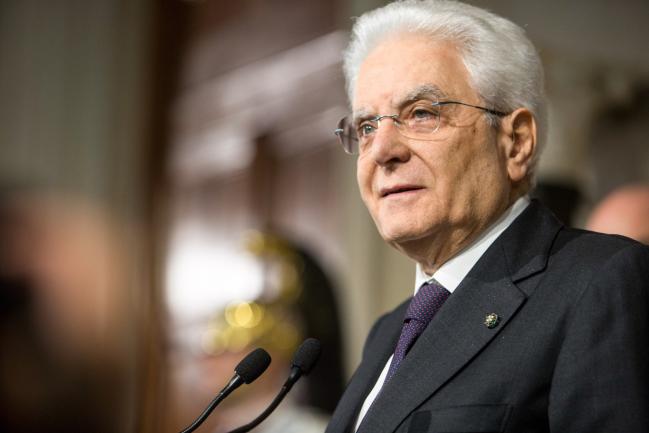(Bloomberg) -- Italy’s populist leaders are asking President Sergio Mattarella for more time to complete their plans for a massive shot of public spending to boost the indebted country’s struggling economy.
Both Luigi Di Maio, 31, of the anti-establishment Five Star Movement, and Matteo Salvini, 45, of the anti-immigrant League, said they’d asked for just a little longer at a meeting with the head of state on Monday. Di Maio mentioned “a few extra days” in his remarks to reporters, adding that registered party members would vote online on the program.
Mattarella, 76, a former constitutional court judge and government minister, has already signaled he could have ways to block unfunded spending plans as he seeks to maintain stability after more than two months of political gridlock.
Mattarella has been concerned about the impact of the populists’ pledges on fiscal and foreign policy since Salvini’s center-right alliance and Five Star emerged as the biggest groups from the March 4 election, according to a senior state official.
Analysts say that the measures are potentially so destabilizing that they would likely run into significant obstacles either from the courts or the parliament. The reaction from markets has so far been muted with the FTSE MIB stock index up 1 percent on the month while the 10-year bond spread has widened by 9 basis points to 132 basis points.
Di Maio said he and Salvini agreed not to publicly identify candidates for the premiership. He mentioned progress on measures including a “citizen’s income,” pension reform, cutting waste in public spending and countering corruption.
Former Eni SpA board member Giulio Sapelli, an economist, is the League’s favored candidate for prime minister while Five Star prefers Giuseppe Conte, a law professor at Florence University, according to officials from the two parties.
For his part, Salvini said he had asked Mattarella for “a few more hours” and struck a more combative tone than Di Maio. He said he wanted a government “to do what I promised Italians” and that differences remain on some important issues. “I hope we meet again as soon as possible because either we get started or we say goodbye to each other,” Salvini said.
Potential Premier
If the populists get to form a government, they will have to manage a slim majority in the legislature -- especially in the 320-seat senate where the two groups have 14 votes more than the opposition. In the lower house, they have a wider margin.
The parties’ draft policies so far echo their key campaign proposals -- a flat tax for the League, and Five Star’s citizen’s income for the poor. Di Maio and Salvini, as well as party officials, held marathon talks throughout the weekend to finalize the program.
The agenda includes a tax set at 15 percent, and at 20 percent for families with a yearly income of more than 80,000 euros, ($96,000) according to a League official who declined to be named discussing a confidential document. A Five Star official said tax rates have yet to be defined. Italy’s current income tax rates range from 23 to 43 percent.
President’s Options
Five Star expects the citizen’s income to cost about 17 billion euros a year, but the head of Italy’s pension agency estimates the price to be as much as 30 billion euros. No funding measures in the draft were disclosed. Italy has the second highest debt burden in Europe after Greece.
Matarella, whom many investors are looking to as a possible moderating influence on a populist administration, flagged on Saturday that he could play an interventionist role in assessing the program, premier and cabinet ministers.
Mattarella recalled “the illuminating case” when Luigi Einaudi, who served as president from 1948 to 1955, refused to appoint the premier candidate offered by the then-dominant Christian Democrats. Mattarella also noted that Einaudi sent two laws back to parliament because of insufficient funding.
Depending on populist progress, Mattarella could name a premier-designate this week; he or she would meet party leaders before presenting a list of ministers to the president for approval. The new government would then be sworn in before facing a vote of confidence in both houses of parliament.
